Dealing with Conflict in the Project Team
As any experienced leader can attest, expecting a team of people to work together seamlessly from the start of a project to the end is likely unrealistic. Teams are made up of individuals who have their own personalities, feelings, backgrounds, and more. Conflict is an inevitable consequence of project work; where there is constant pressure to achieve targets within strict time and resource constraints.
This remains true no matter how well planned a project may be, it will always be subject to unforeseen demands and the direction of the project may need to change as it progresses. Conflict often arises from decisions that inconvenience people, but are nevertheless essential to the success of the project.
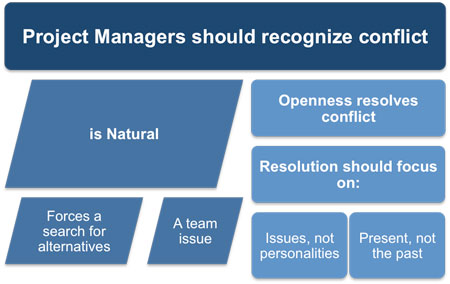 |
There are many more examples of why conflict occurs during project and all successful project managers need to be aware of how best to deal with it. Generally speaking conflict should be addressed early and usually in private, using a direct, collaborative approach. It is important to recognize that:
• Conflict is natural and forces a search for alternatives,
• Conflict is a team issue,
• Openness resolves conflict,
• Conflict resolution should focus on issues, not personalities, and
• Conflict resolution should focus on the present, not the past.
Conflict is an inevitable consequence of project work; where there is constant pressure to achieve targets within strict time and resource constraints. This remains true no matter how well planned a project may be, it will always be subject to unforeseen demands and the direction of the project may need to change as it progresses. Conflict often arises from decisions that inconvenience people, but are nevertheless essential to the success of the project.
In a pure project environment, the human resources decision-making authority rests with the project manager. However, in a matrix environment where resources are being borrowed from other departments, all major decisions will be reached by agreement between the project manager and the relevant line manager.
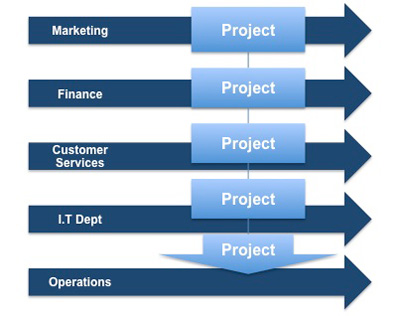 |
Conflict arises because project managers tend to view their own project as taking priority whereas departmental managers will tend to view things from a departmental perspective. This becomes especially evident when a project falls behind schedule and external departments are then expected to extend their commitment of personnel to it.
Another issue is that it is in the project manager's interest to minimize each external departments billing to the project but departmental managers often try to secure as much of the projects budget as possible.
In addition, technical conflicts are common where a department is supporting the project in a technical capacity and project manager rejects the solution preferred by the department on technical, cost or scheduling grounds.
As well as conflicts between the project management team and people outside of the project, there are often internal conflicts to deal with. In these cases the project manager will usually have the final say. He or she must step in and handle these kinds of conflicts to make sure that progress is being made and the project is continuing to move in the right direction.
The aim should always be to resolve things in a way that everyone involved can live with rather than coming down too firmly on one side at the expense of the other. The effect of doing the latter may be to alienate one of the protagonists to such an extent that they leave resulting in valuable time and effort being wasted replacing them.
Even if your team is getting along well from a personality standpoint, there is still management to be done. Overseeing the productivity and reliability of each of your team members is important to stay on track to meeting the deadline of the project as a whole. Only when the individual people that make up your team are on track will the project be able to move forward properly.
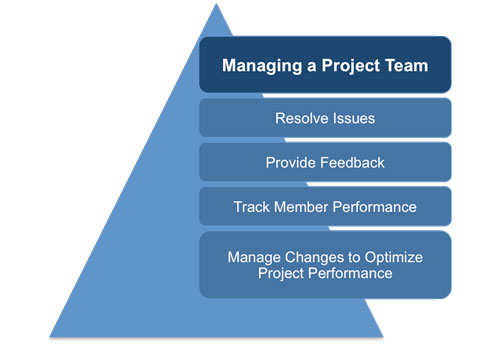 |
The skill of a good project manager really starts to show through when they are able to get the best out of each and every person on the team. Project HR management is critically important for reasons that should be relatively obvious. Without a good team of people working on a project, it is going to have trouble getting traction and is unlikely to ever be completed.
People are what make projects move forward, even more so than resources like equipment or money. Your team can be made up of people from within the organization or include some brought in from the outside to fill specific roles. If you are serious about being successful with your next project, you should leave no stone unturned in finding the best possible team that is available to you.
Part of this success relies on your ability to manage the working relationships of the different groups of people involved in the project - team members, contractors, stakeholders and the sponsor. Managing the communications between each of these groups is vital to the success of a project. Being able to plan what to communicate to who and when is critical for a project manager.
Those who are proficient project mangers have developed the ability to quickly and accurately discern the personalities, competence, knowledge and skills so that they can assess the level of interest and influence each individual working on the project has. One of the most efficient tools used is that of 'networking' with all those involved in the project environment.
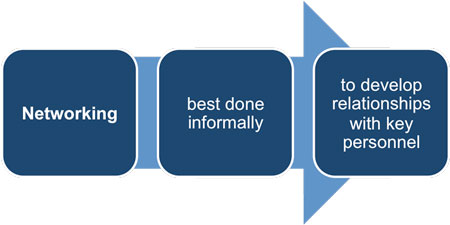 |
Often the most effective networking is that conducted informally such as during a break, traveling to meetings or over lunch. This enables the project manager to fully understand the interest and motivation of the different individuals needed to complete the project on time and within budget. By building up this depth of understanding of the people working in your project environment you can minimize conflict and get things done, because it is people who deliver a project.
It can be tempting not to bother networking because it seems less important than producing charts, updating plans and all of the other more tangible outputs of the project management process, but is a dangerous approach because important snippets of how people really feel are more often than not revealed this way.
To be an effective networker it is essential that you are a good listener and observer. By actively listening to the words, mannerisms and postures of the other person are able to communicate more efficiently with other project team members and stakeholders. Your communications form a vital part of managing the project team and planning is vital if you want to reduce the impact conflict and disputes have on the team and its productivity.
Managing human resources is probably one of the most complex areas for a project manager requiring a wide range of interpersonal skills, it must not be neglected or overlooked. People can be unpredictable, can give rise to an expected conflict, the level of their morale can go up or down, and also of course for either personal or professional reasons, some may leave the project in an unplanned manner.
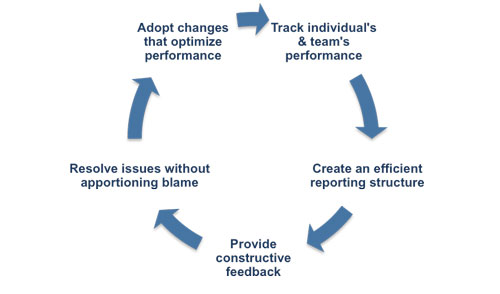 |
Whilst such issues cannot be removed completely, the damage they cause can be reduced or contained by following certain management principles:
Track team member performance
Create and enforce an efficient reporting structure
Provide constructive feedback
Resolve issues without apportioning blame
Manage changes to optimize project performance.
Our online library has free eBooks, checklists and templates that will help you develop these skills, which are outside of the scope of this project management eBook. For example, leadership, communications, appraisal, coaching and people skills. You can check out the complete range of project management pdf eBooks free from this website.
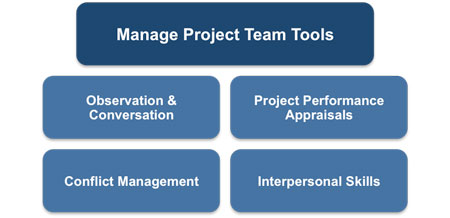 |
Managers are all given goals to attain and project mangers are no different, they have to achieve project objectives in a specified time frame and budget. This involves he or she managing each of the project functional areas (Schedule, Budget, Quality etc.) while implementing and managing project team process. Keeping the team working at their optimal performance levels is a vital part of the project team management process.
This means that project managers have to have excellent communication, conflict management, negotiation, and leadership skills to be successful. There are management tools you should use to enhance and develop your skills one such tool is conducting performance appraisals for those on the project team.
It provides an excellent opportunity to clarify roles and responsibilities, as well as give constructive feedback to team members. This process often enables the project manager to discover unknown or unresolved issues enabling he or she to address the latter by establish training requirements or setting future goals.
Whether or not appraisals are appropriate will depend on the nature of the project. Generally speaking they would be appropriate in the case of a long-term project staffed by permanent employees of the organization but would not be used in a short-term project or one that was staffed by outside contractors.
Many developing problems can be addressed before they get out of hand by a project manager who 'knows instinctively' when something is up rather than waiting for it to be formally reported. If you take the time to talk briefly and informally with team members (on your way to get a coffee for example) you will develop a feel for the normal atmosphere of the project. This approach to management is sometimes referred to as 'management by wandering around' (MBWA).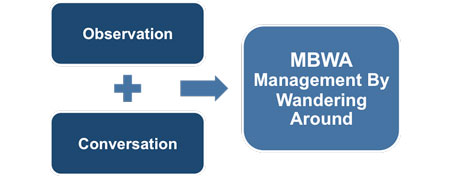 |
The emphasis is on the word wandering as an impromptu movement within a workplace, rather than a plan where employees expect a visit from managers at more systematic, pre-approved or scheduled times. There are several other benefits to MBWA:
1) It doesn't take up much time (maybe 15 minutes a day).
2) You get to learn more about individual team members and you may find them making suggestions for improvements that they wouldn't make through formal channels.
3) Generally speaking people like to see their managers mixing with them, which is good for morale.
Human beings are very sensitive to changes in non-verbal behavior. So, if you feel that something is not quite right then asking people if they have any problems or concerns can often bring issues to light that would have serious consequences if you remained unaware of them until they were formally reported.
The success of project managers in managing their project teams often depends a great deal on their ability to resolve conflict. Different project managers may have different conflict resolution styles. Factors that influence conflict resolution methods include:
• Relative importance and intensity of the conflict,
• Time pressure for resolving the conflict,
• Position taken by players involved, and
• Motivation to resolve conflict on a long-term or a short-term basis.
A key part of managing such conflicts and motivating the project team comes down to the ability to communicate clearly to everyone involved in the project. Careful planning of project communications will ensure success at all levels of involvement from team members, to contractors from sponsor to stakeholders.
You may also be interested in:
Managing a Project Team | Developing the Project HR Plan | Building an Effective Project Team | Developing the Project Team | Dealing with Conflict in the Project Team | Planning Project Communications | Optimizing Project Communications | Managing Project Communications | Identifying Project Stakeholders | Keeping Project Stakeholders Informed.
|
|


